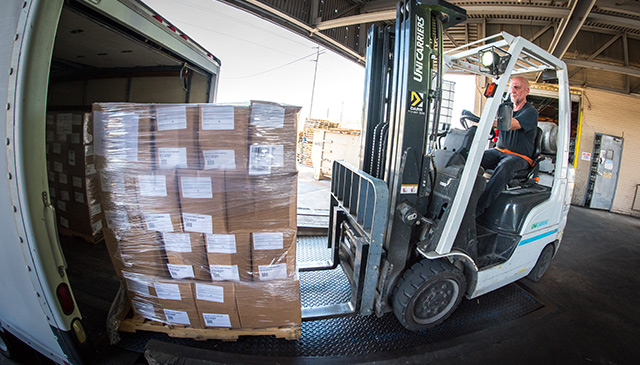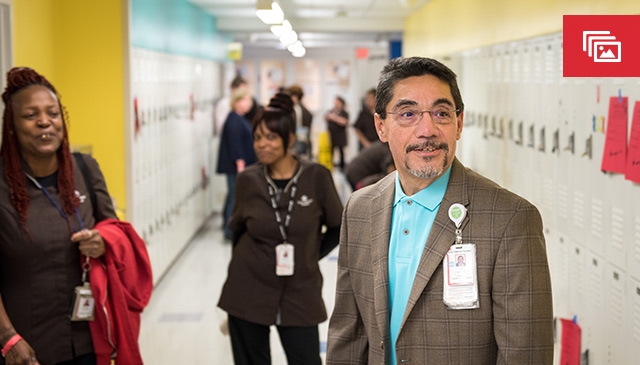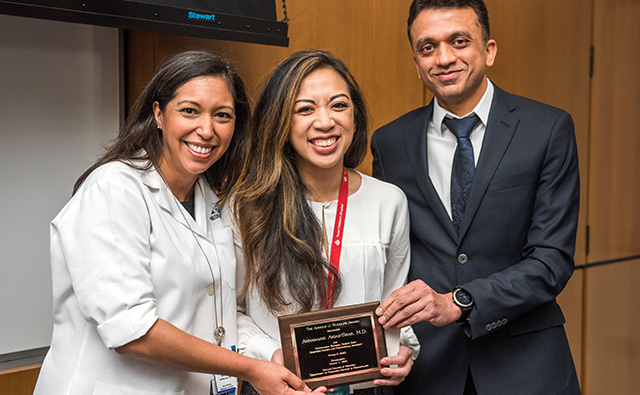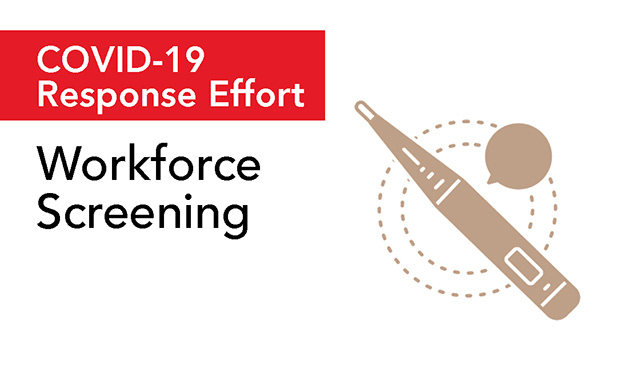
On his blog this week, Mark Wallace shares an inspiring Brene Brown podcast and reminds us all to fill in the gap for each other in the days and weeks to come. Read more

On his blog this week, Mark Wallace shares an inspiring Brene Brown podcast and reminds us all to fill in the gap for each other in the days and weeks to come. Read more

If you think it’s tough to get a hold of toilet paper and hand sanitizer for your house of four, just imagine doing it for a health care system that sees over 4,000 children and women daily. Shoring up supplies for a critical population like ours is no small feat. It takes strong leadership to think ahead, secure partnerships and ensure we are prepared with the right supplies to continue to deliver care to patients who need us.
While the global coronavirus pandemic has created numerous challenges for health care – and for many other industries across the U.S. and around the world – Texas Children’s Supply Chain Team is helping us lead the charge to ensure all of our patient care facilities maintain adequate supply during COVID-19.
“We continue to support our patient care activities across the system, and with more incoming shipments on the way, we will add to our current supply in the days and weeks ahead,” said Texas Children’s Senior Vice President for Facilities Operations Bert Gumeringer. “We are able to meet this goal through collaborative relationships that we have built with our supply chain and community partners.”
Early on in the hospital’s response to COVID-19, Texas Children’s Supply Chain Team focused its efforts on increasing the organization’s inventory of supplies that are maintained in our warehouse – these items include masks, gowns and hand sanitizer – all of which are in short supply across the country.
In addition to collaborating with our traditional supply chain partners, Texas Children’s has been working diligently to acquire products outside of the hospital’s normal channels, which has proven beneficial:
While significant progress has been made to ensure Texas Children’s has adequate supplies to support daily operations, engaging in good conservation practices is equally important.
“We encourage our employees and staff to continue to wash their hands frequently with soap and water to help conserve our supply of hand sanitizer,” Gumeringer said. “It’s also important to keep calm. While we’ve been through catastrophic hurricanes and storms, we will get through COVID-19 together as well.”

For many Texas Children’s employees, gone are the days of the morning commute.
Our efforts to fight COVID-19 through the practice of social distancing has required more than 1,000 staffers – and counting – to work from home. But what does it take to make this work?
Teresa Tonthat, assistant vice president for Information Services, says there are multiple factors to consider. Her department has spent the past few weeks ensuring that employees who are asked to work remotely can do so in a seamless way.
This includes assessing the current technologies, equipment requirements, and available network capacity to effectively support these employees; all while continuing to serve our patients and caregivers.
The good news is that we now have a well-defined plan in place.
Be prepared for bumps in the road, this is GLOBAL.
However, digital technology is never 100 percent available – even on the best days.
“As millions of people and organizations shift to remote working, our internet networks will be tested. We are experiencing a mass human behavior change across the globe,” Tonthat said. “The internet’s infrastructure will be strained and will be felt in the networks inside employee’s homes, and the internet services (i.e., Comcast, AT&T, and Verizon) that these networks rely on.”
Many remote workers will share the same internet connections throughout the day with household members. Household members could be using data-intensive applications and that surge in internet access could strain home networks.
Overall, as entities around the globe are moving to remote work environments to promote social distancing, local commercial and residential internet and telecommunication infrastructures (i.e., WebEx, Zoom, Teams, Video, etc.) are seeing increased traffic load. While our cloud telecommunication vendors are doing their best to increase capacity to mitigate availability issues, our local internet service providers may also experience issues with the high demand…
Just last week, virtual cloud platform vendors such as WebEx and Teams reported infrastructure capacity issues. Many organizations across the nation felt the disruption to virtual online meetings. And this is just the beginning.
For additional questions, please contact your manager or supervisor for support and guidance.

Elex Sanchez draws on his more than 25 years in the hospitality industry to bring the same level of customer service, attention to detail and visitor experience standards to our pediatric patients and their families.
Sanchez and his team start every shift with a huddle to discuss the day’s tasks and calisthenics to warm up for the physical demands of the job. Members of the team include floor care techs, unit support assistance, recycling techs, and lead techs who manage small, tactical groups like operating room (OR) technicians focused on daily terminal cleans in the OR. A terminal clean is a very deep, detailed cleaning process with special disinfectants requiring a certain amount of “kill time” to work properly.
Right now, as the spread of a global pandemic is knocking on our doors, the Environmental Services team is working hard to keep it at bay. This Texas Children’s team is well stocked and has proactively worked with vendors to secure a surplus of cleaning supplies, as an additional layer of readiness should it become difficulty to procure such items in the future.
Texas Children’s Environmental Services also employs five ultra violet light disinfection systems for ORs, isolation units or any other potentially contaminated areas in the hospital. First, the techs clean the room and then bring in the robot system to shine ultraviolet light from multiple, flexible arms. The whole process takes about 50 minutes. Texas Children’s has had five systems in place for about six months, and is in the process of procuring seven more units.
The team has also increased cleaning schedules and now completes 12 cleanings per day over three shifts in public spaces and restrooms, and also completes four to six cleaning rounds in lobbies and waiting rooms.
“We call ourselves ‘warriors for infection control.’ Essentially, we are infection control and our teams are on the front lines every day ensuring our patients and staff have a safe, sanitized and sparkling clean environment,” said Sanchez.

Texas Children’s greatest priority throughout our response to COVID-19 has been protecting the health and safety of our patients and our people. As part of this effort, we are working hard to provide our team members with resources and support for navigating this evolving situation both professionally and personally – including assistance with the child care needs that many of you may have at this time. To help you meet those needs, Texas Children’s has partnered with the YMCA of Greater Houston to provide temporary child care for our employees.
Beginning Thursday, March 26, several YMCA locations began providing child care services for the following age groups:
Children: Ages 5 to 12 Years
Program will run from 6:30 a.m. to 7:30 p.m. daily
45 spots available per site on a first-come, first-served basis (see below for locations across the Houston area)
Various fun enrichment activities such as arts, crafts, games, literacy, STEA(rts)M program in partnership with the Children’s Museum and more
Lunch and afternoon snacks to be provided by the Houston Food Bank
If the Houston Food Bank is unable to provide meals, you will be notified in advance to provide necessary meals for each child daily
For additional information, please email daycamp@ymcahouston.org
Children: Ages 3 to 4 Years
Infants: Ages 12 Months to 35 Months
Care will be provided at YMCA sites designated for early care (see below for locations)
Program will run from 6:30 a.m. to 7:30 p.m. daily
45 spots available per site on a first-come, first-served basis
For additional information, please email childrensacademy@ymcahouston.org
Who is eligible?
All Texas Children’s employees and our Baylor partners based at Texas Children’s can participate in this temporary child care option.
Where are the YMCA child care locations?
Below are a list of current YMCA child care locations. YMCA will continue to assess community needs and may potentially open new sites in the future.
Children: Ages 5 to 12 Years
Houston Texans YMCA
5202 Griggs Road
Houston, TX 77021
713.748.5405
D. Bradley McWilliams YMCA
19915 SH 249
Houston, TX 77070
281.469.1481
The Woodlands Family YMCA @ Shadowbend
6145 Shadowbend Place
The Woodlands, TX 77381
281.367.9622
Fort Bend Family YMCA
4433 Cartwright Road
Missouri City, TX 77459
281.499.9622
Vic Coppinger Family YMCA
2700 YMCA Drive
Pearland, TX 77581
281.485.6805
Weekley Family YMCA
7101 Stella Link Blvd
Houston, TX 77025
713.664.9622
Mark A. Chapman YMCA
1350 Main Street
Katy, TX 77494
281.665.1213
Lake Houston YMCA
2420 West Lake Houston Parkway Kingwood, TX 77339
281.360.2500
(Opens Monday, March 30)
Children: Ages 3 to 4 Years
Infants: Ages 12 Months to 35 Months
The Woodlands Family YMCA @ Shadowbend
6145 Shadowbend Place
The Woodlands, TX 77381
281.367.9622
Texas Medical Center YMCA
5614 H. Mark Crosswell, Jr.
Houston, TX 77021
713.747.2173
Wendel D. Ley Family YMCA
15055 Wallisville Rd.
Houston, TX 77049
281.458.7777
Houston Community College
3214 Austin St.
Houston, TX 77004
713.718.5437
D. Bradley McWilliams YMCA @ University Park
11144 Compaq Center W. Dr.
Houston, TX 77070
281.257.6600
Huntsville Family YMCA
2906 Old Houston Road.
Huntsville, TX 77340
936.295.8009
M.D. Anderson Family YMCA
705 Cavalcade
Houston, TX 77009
713.697.0648
How do I know my children will be safe?
To support a safe and hygienic environment, the YMCA has implemented the following measures:
How much are the child care services?
Children
Infants
Please note you will make payment directly to the YMCA during the registration process.
How do I register?
To sign up, click here to select the location(s) you are interested in to view available spots. To complete your registration, you can either log into your current YMCA account, create a new one or check out as a guest.
When you check out as a guest, please select the Program Member option so you do not need to purchase a membership.
How do I check in on-site?
To verify you are a health care provider, please be prepared to show your Texas Children’s badge ID as proof of employment.
Questions?
Please email YMCA at daycamp@ymcahouston.org for school-age care or childrensacademy@ymcahouston.org for early care.

Drs. Melissa Carbajal and Muralidhar Premkumar, Neonatology faculty and fellowship program leadership, congratulate third-year fellow Dr. AnnaMarie Arias-Shah as the 25th annual Arnold J. Rudolph Memorial Grand Rounds award recipient. The award recognizes third-year fellows in neonatal-perinatal medicine for outstanding teaching, patient care, scientific inquiry and professional integrity. Dr. William E. Benitz, Philip Sunshine Professor of Neonatology in the Division of Neonatal and Developmental Medicine at Stanford University School of Medicine, was this year’s invited speaker at the recent grand rounds.
The Arnold J. Rudolph Memorial Grand Rounds was established in 1996 by the Section of Neonatology, in the Department of Pediatrics at Baylor College of Medicine, in memory of its late Section Chief, Dr. Arnold J. Rudolph, who died in 1995. Dr. Rudolph was a well-respected clinician and educator, recognized internationally as a leader of neonatology.

As part of our COVID-19 preparedness efforts, Texas Children’s is establishing mandatory screenings for all employees and staff beginning Monday, March 23.
Refer to the list of checkpoints below for your designated screening location. Plan to arrive at your designated screening location at least 15-30 minutes early. Some locations will have lengthy lines as our screeners and employees become more accustomed to this process. Allow yourself some additional time to get through screening and report to your normal work location as required. Employees will not receive compensation for any screening wait times.
If you are cleared to work, please place your wristband as soon as it is received.
Check your own temperature and symptoms before reporting to work. Do not come to work if you are sick. Your temperature will be checked as part of your screening and if you present symptoms consistent with COVID-19, you will not be allowed on site and will be provided information as to when you are able to return to work.
Each day that you are cleared to work, you will receive a different wristband each day to indicate you have been cleared. Be sure to wear your wristband and remind others to do the same.
Medical Center (includes Meyer building)
Feigin Circle for walkers and drop-offs
Garage 11 – Entrance
Garage 19 – Level 1 through 8
Legacy Tower – B3, B4 elevators only
West Campus
Back MOB entrance near service elevators
The Woodlands
MOB second-floor bridge
Health Plan
Main Lobby entry
Texas Children’s Pediatrics and Urgent Care
Upon entry to the practice/site
Specialty Care
Bellaire: near service elevators
Clear Lake: rear employee entrance
Cy-Fair: rear employee entrance
Sugar Land: first floor lobby by rear parking lot entrance
Maintain social distancing. Keep a safe distance (approximately 6 feet) between yourself and others while waiting in line to be screened and encourage your colleagues to follow suit. Stay in touch with your leader. We know it will take time to get used to being screened as part of your routine. Reach out to your leader for support and guidance throughout this process. Be mindful of Texas Children’s travel guidelines. You will be asked to answer travel questions as part of our screening. Remember: Any workforce member (employees, Baylor faculty or staff members) who has traveled greater than 150 miles cannot report to work at Texas Children’s until the 15th day following your return from travel. If you have returned to work already, you will be sent home until you meet this criteria.
To provide additional guidance and clarity about how Texas Children’s is assessing and clearing team members for on-site or remote work, click here to view these guidelines. Note, these will be updated as the situation evolves.